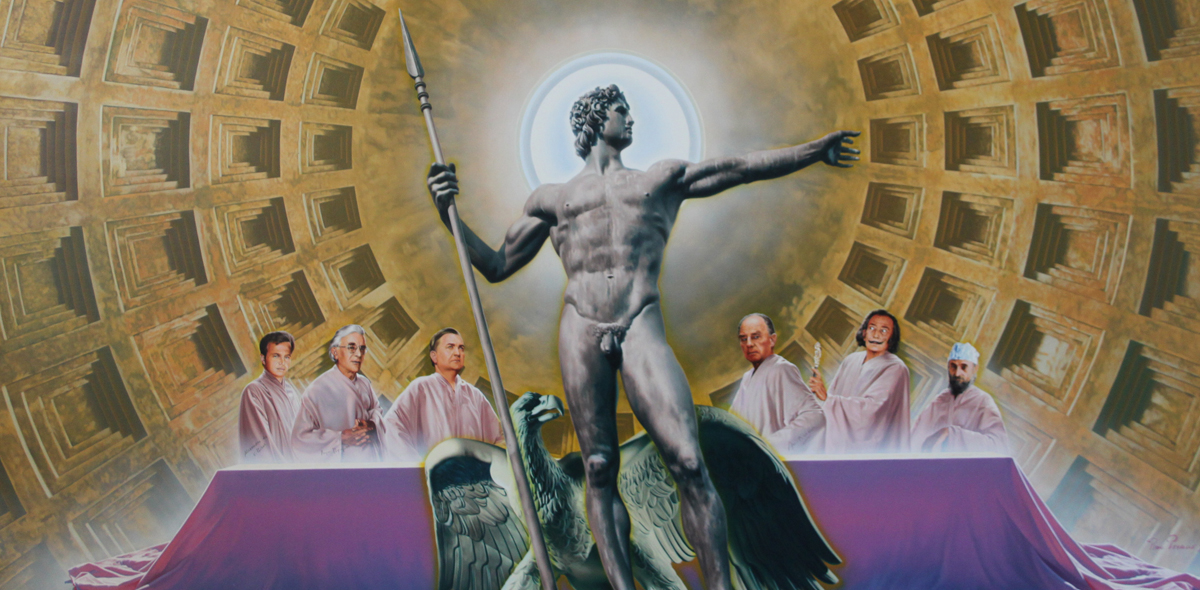Alexander-orden

(the english version below)
Der Alexander Orden pour le Mérite für Kunst und Wissenschaft ist eine freie Gemeinschaft, die sich geistigen Idealen von Alexander dem Großen (356–323 v. Chr.) verbunden fühlt. Dazu zählen Völkerverständigung, Menschenrechte, Hilfsbereitschaft, die Bewahrung humanistischer Traditionen in Kultur, Kunst, Wissenschaft und Lehre sowie die gegenseitige Achtung der Religionen.
Wesen und Wirken auf Schloss Nörvenich
Schloss Nörvenich ist Tagungsort des internationalen Alexander Ordens Pour le Mérite. Im Rittersaal der historischen Anlage finden die traditionellen Alexander-Dinner statt. Die Pflege des Andenkens Alexander des Großen in Zirkeln und Freundeskreisen geht Jahrhunderte zurück. Vor allem der Adel hatte immer wieder durch die Wahl des Vornamens Alexander sich zu dieser historischen Gestalt als Vorbild bekannt. So trugen in der europäischen Geschichte Kaiser, Könige, Fürsten und sogar Heilige und Päpste den Namen Alexander. Hinzu kamen Wissenschaftler, Forscher und Künstler. Aus diesen Kreisen entwickelte sich der unpolitische Alexander-Orden, der schöngeistige Dingen in den Mittelpunkt rückte. Die Aufnahme in den Orden war nur ausgewählten Personen vorbehalten. So kam die Gemeinschaft in den Verdacht eines „Geheimbundes“.
Mit dem 19. Jahrhundert kam mehr Liberalität in die Gemeinschaft. Ab etwa 1845 orientiert sich der Orden am „Orden Pour le mérite für Wissenschaften und Künste“, den König Friedrich Wilhelm IV. von Preußen durch Stiftungsurkunde vom 31. Mai 1842 dem Orden Friedrich des Großen Pour le mérite als Friedensklasse für die Verdienste um die Wissenschaft und die Künste hinzugefügt hat.
The Alexander Order for Art and Science
Is a free society connected to the spiritual ideals of Alexander the Great (356-323 BCE). Ideals of the Order include understanding among people, respect for human rights, tolerance, readiness to help, a social consciousness, the preservation of the humanistic tradition in art, culture, science and teaching, as well as the mutual respect for all religions. Every engagement of the Alexander Order is directed toward public benefit. To its organizational structure belong: the Grandmaster, the Chancellor and various action groups for culture, science and arts.
Alexander in History and Mythology
The personality of Alexander the Great has fascinated men of the varied interests for more than 2,000 years. Already during his lifetime, cities and temples were named after him in his honor. Alexandria in Egypt is a testament to his influence and nobility. Emperors, Czars, Kings, Popes and Cardinals have receivedthe name Alexander in honor of this historical king from Macedonia. Scientists and researchers, artists, composers and musicians have borne this name throughout history. Even in the 21st century there are countless settlements and geographic markings around the world which date back to the time of Alexander the Great.
This fascinating ruler, who left behind a world empire after a life of only 33 years, influenced–even after his death–noble and uplifting thoughts, poetry, and literature. Thus, the „alexandriner“ in poetry is a style, which has been used in the 12th century in novels about the life and achievements of Alexander. Countless books and essays have been written about Alexander. Poems and hymns in many languages extoll Alexander. Again and again, film documentaries attempt to inform about him and bring closer to us the life, thinking and work of Alexander. Internationally in 2004, the latest film in a Hollywood style „Alexander“ (by Konstantin-Film) brought Alexander’s personality and achievements to the widest public. With Alexander, to conquer the world. The title role plays Colin Farrell.
The Alexander Order bearing the name of the famous world ruler and social reformer does not deny that the conquests and wars of the royal son from Macedonia brought also blood and tears. The Alexander Order resolutely rejects war and force as means to resolve conflicts in our time. It advocates positive initiatives for a better world.
Grandmasters of our time
included among others: Princess Luise of Prussia, the daughter of the last German Kaiser; Paul I., the King of Hellenes (Greece); Erica Pappritz, the first Chief of Protocol of West Germany under Konrad Adenauer; Roger Peyrefitte, writer (France). After the death of Roger Peyrefitte, the scientist and inventor Dr. Wilson Greatbatch, the inventor of the heart pacemaker (USA), has continued in this honorary office.
